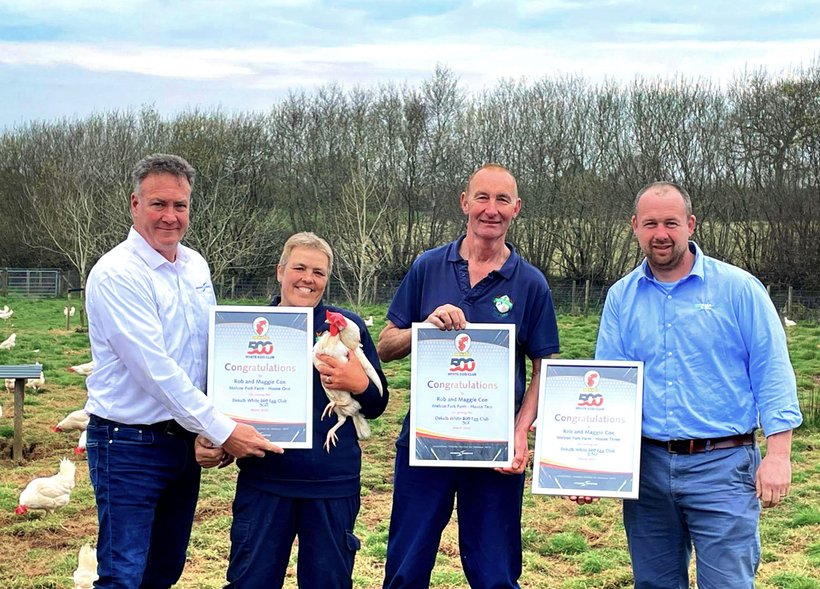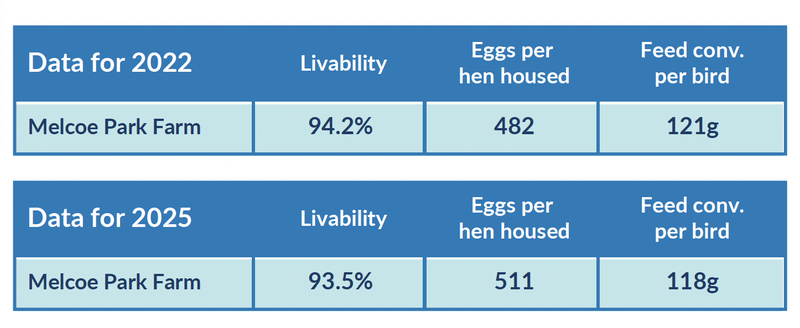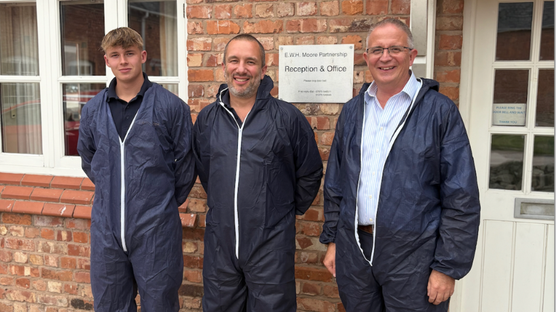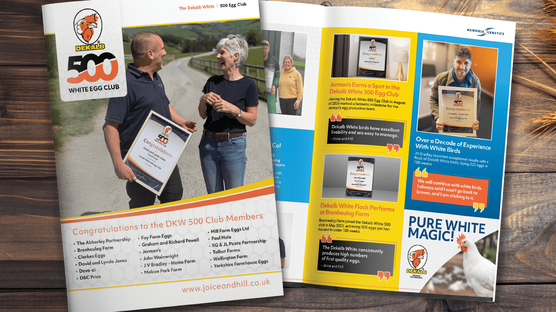
Published on March 14, 2025
Melcoe Park Farm Record Superb Results from Meticulously Managed White Flocks
It’s all change at Melcoe Park Farm as Maggie and Rob Coe add a fourth mobile unit to their Devon farm.
In 2022, the Ranger reported on how enrichment, optimisation of capacity, and a focus on welfare were paying off for Melcoe Park Farm. Back then, Maggie and Rob Coe might have been described as early adopters in the nascent shift towards white birds in free range systems. Now there is a growing acceptance of the multifarious positives of white egg production, and Maggie and Rob are more convinced than ever that their decision to take up white egg production was the right one.
Independence and flexibility
After thirty years managing broiler breeder farms, Maggie and Rob Coe were keen to put their experience to use by setting up a business that would provide a level of independence, and the flexibility of self-employment. So, nine years ago, they bought 30 acres of Devon farmland and began their journey as a white free-range egg producer.
They now have 6000 Dekalb White birds housed in four McGregor mobile units. The chicks were hatched by Joice and Hill and rearing was split across Noble and Will Frankpitt. “The quality of the most recent pullets was exceptional at 15 weeks and 4 days, they were even sized, nice and steady. This is the result of excellent chick quality and careful rearing” Rob commented.
Whilst they were originally sceptical, Melcoe Park Farm were won over from the start by the temperament and performance of the Dekalb White birds, and with support from Kevin Garner of Joice and Hill, the figures are very impressive.
“It’s little wonder that Maggie and Rob are enthusiastic about the merits of white birds. In the first flock the mortality rate was very low at half the breed target, and in one shed the hens were still laying at 88% when they were 96 weeks old.” says Kevin.
“The figures for the second flocks which depleted in February are even more impressive. Across the three houses the average number of eggs per hen housed at 98 weeks was 511, with one house recording amazing egg numbers of 530.” he adds.

A passion for enrichment and bird welfare
Enrichment and bird welfare are an absolute passion at Melcoe Park Farm. Maggie and Rob absolutely live for their birds, which are free to range from 9.00 am till dusk. The attention to detail shows in the production performance.
“We have learnt what makes the Dekalb White birds happy and that’s what we give them. They don’t like toys such as hay nets, they show no interest in them - in fact they leave them untouched for weeks. However, they love swings and tubs, so we use colourful sheep tubs which are carefully disinfected. They just don’t like to destroy things, they are not that kind of bird, in fact visitors often observe how calm the birds are.
“We have kept mortality very low by caring for every bird that gets injured, nursing them back into full production. We created a “hospital pen” so if birds fall or get injured, they can be nursed and cared for until they are well and then they carry on laying.” Maggie explains.
All change
In addition to installing a fourth mobile unit, taking total numbers to 6,000, Melcoe Park Farm have a new packing contract and feed supplier. Explaining the decision, Rob says. “It’s a better contract for us and they have been very helpful. A lot of eggs go to London restaurants who really like the richer yolks, which we are getting from the all-natural feed options available from the new supplier. Kevin Garner has also advised us to limit the amount of feed on the track, at any one feeding, which allows the birds to get to the minerals at the bottom of track. The net result is greater feed efficiency and improved bird health as they get the full benefit from the minerals in the diet.”
Ideal for a small-scale producer
The McGregor houses are ideal for small-scale producers, providing an economical way to start production. Conforming to RSPCA Assured standards, a raised slatted floor makes up 66% of the floor area. This raised floor is formed of interlocking plastic tiles fitted into a grid of angled beams, supported by box section beams. Pop-holes are evenly distributed across both sides of the building with a provision for one pop-hole per 600 hens. Exceptional insulation protects flocks against variable temperatures.
The design and material specification combine to create an environment that is easy to clean and disinfect. This enables Rob and Maggie to manage efficient turnarounds themselves, with the help of John Warne who moves the sheds off the bases before clean-out.
Support and guidance
Rob and Maggie have been able to draw on support and guidance from industry professionals, including pullet rearers, breed reps, feed and even local farming neighbours lending a hand.
On the feed side, David Small has been a great support right from the beginning, giving continued support, while John Warne provides assistance with the meticulous placement of the mobile sheds after cleanout. Rob is also an advocate for Fossil Shield. “We have never had Red Mite” he says “We use Graham Gadsby of PCS Poultry two days before birds are due to arrive, and the vet reports are consistently clear.”
Looking to the future
Melcoe Park Farm believe that white birds are the future. There is planning permission in place for one further shed and there is little doubt it will be stocked with white birds when it comes on stream.
Group photo left to right: Kevin Garner of Joice and Hill, Maggie and Rob Coe, David Small of Crediton Milling



